-
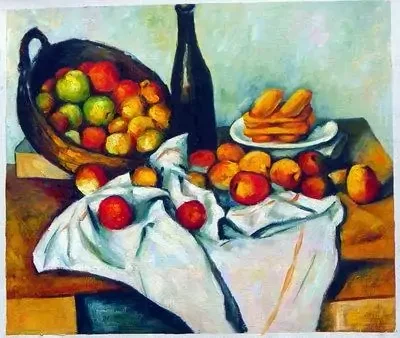 Paul used oil on canvas for this painting representing nature; he used heavy modeling, solid brushstrokes, and glowing colors give the composition a density and dynamism that a more realistic still life could never possess.
Paul used oil on canvas for this painting representing nature; he used heavy modeling, solid brushstrokes, and glowing colors give the composition a density and dynamism that a more realistic still life could never possess. -
 This painting is one of Cézanne’s first paintings of bathers, a subject that engaged him for the rest of his career; although he was uncomfortable of the nude scenery, he found a way to use oil on canvas by demonstrating the scenery of nature along with the human body.
This painting is one of Cézanne’s first paintings of bathers, a subject that engaged him for the rest of his career; although he was uncomfortable of the nude scenery, he found a way to use oil on canvas by demonstrating the scenery of nature along with the human body. -
 The title means The Young Ladies of Avignon, the painting is by the famous Pablo Picasso; he also used oil on canvas on this painting. Most feel uncomfortable looking at this painting as it consists on women nudity but it has become one of his famous paintings.
The title means The Young Ladies of Avignon, the painting is by the famous Pablo Picasso; he also used oil on canvas on this painting. Most feel uncomfortable looking at this painting as it consists on women nudity but it has become one of his famous paintings. -
 This painting highlighted Georges' obsession with form and stability, it was fueled with a desire to create an illusion in a viewer's mind to move around freely within the painting; this would be considered Analytic cubism. It was meant to play tricks into the mind by creating illusions through geometric shapes.
This painting highlighted Georges' obsession with form and stability, it was fueled with a desire to create an illusion in a viewer's mind to move around freely within the painting; this would be considered Analytic cubism. It was meant to play tricks into the mind by creating illusions through geometric shapes. -
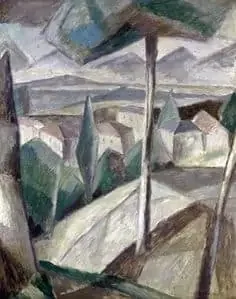 Woman with Phlox (Femme aux Phlox) is a Cubist Oil on Canvas Painting created by Albert Gleizes. The painting shows as woman holding flowers within the grey and white geometric shapes he used.
Woman with Phlox (Femme aux Phlox) is a Cubist Oil on Canvas Painting created by Albert Gleizes. The painting shows as woman holding flowers within the grey and white geometric shapes he used. -
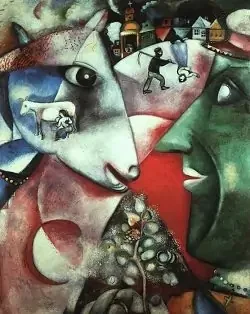 This painting was created after Marc moved to Paris, he wanted to highlight his memory of it and what he seen. He used vibrant colors and loose geometries to highlight the scene nostalgic and magical signal his awareness, among other things, of the new fractured and fragmented visual language of Cubism.
This painting was created after Marc moved to Paris, he wanted to highlight his memory of it and what he seen. He used vibrant colors and loose geometries to highlight the scene nostalgic and magical signal his awareness, among other things, of the new fractured and fragmented visual language of Cubism. -
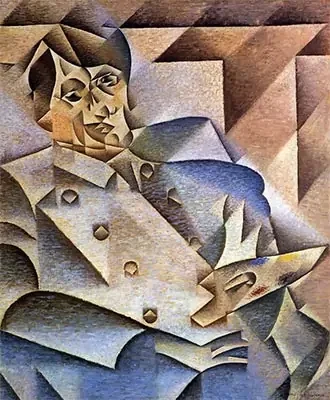 Juan Gris met Pablo Picasso back in 1906 when he traveled to Paris; this is when he started participating in cubism art. In this painting he used a systematic geometry and crystalline structure; he also used oil on canvas on this artwork. After 6 years, he became a Cubist artist, following the inspiration of Pablo.
Juan Gris met Pablo Picasso back in 1906 when he traveled to Paris; this is when he started participating in cubism art. In this painting he used a systematic geometry and crystalline structure; he also used oil on canvas on this artwork. After 6 years, he became a Cubist artist, following the inspiration of Pablo. -
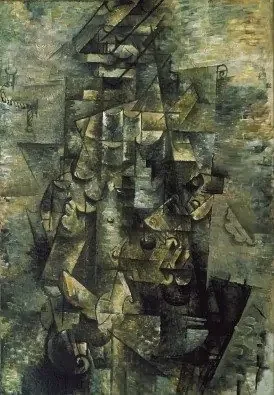 This painting by Braque was one of the first painting to distinguish the Cubism movement along with Pablo Picasso. He used oil on canvas; it employs a monochromatic scale, primarily using shades of brown and gray, this technique flattens out the space and creates depth through angles.
This painting by Braque was one of the first painting to distinguish the Cubism movement along with Pablo Picasso. He used oil on canvas; it employs a monochromatic scale, primarily using shades of brown and gray, this technique flattens out the space and creates depth through angles. -
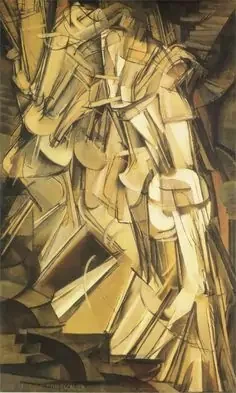 This painting peeled away the traditional beauty of the nude in art; this was meant to represent a body in motion walking down a narrow stairway. He used oil on canvas; the painting is meant to me disoriented, it's a tangle of shattered geometric shapes throughout the staircase.
This painting peeled away the traditional beauty of the nude in art; this was meant to represent a body in motion walking down a narrow stairway. He used oil on canvas; the painting is meant to me disoriented, it's a tangle of shattered geometric shapes throughout the staircase. -
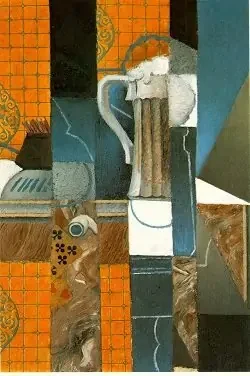 Juan Gris was one of the famous cubism artist during this period; this painting is a great example of Synthetic Cubism, where the artist reintroduces color, texture, pattern, and recognizable objects through oil and paper on canvas. This painting showcases a portrayal of a glass of beer and a deck of cards, which remain recognizable to the viewer; he uses lines and geometric figures in the painting which creates an optical effect.
Juan Gris was one of the famous cubism artist during this period; this painting is a great example of Synthetic Cubism, where the artist reintroduces color, texture, pattern, and recognizable objects through oil and paper on canvas. This painting showcases a portrayal of a glass of beer and a deck of cards, which remain recognizable to the viewer; he uses lines and geometric figures in the painting which creates an optical effect. -
 This was created by a French painter, Fernand Leger; he was known in creating artworks of illusions of a city. He used clashing shapes and vivid hues of color; his medium was oil on canvas.
This was created by a French painter, Fernand Leger; he was known in creating artworks of illusions of a city. He used clashing shapes and vivid hues of color; his medium was oil on canvas. -
 This work by Juan Gris was crafted in the cubist style and is now categorized as a portrait; he used oil on canvas a he did with his other paintings. This painting is filled with abstracted shapes, and the guitar, while also geometrically stylized, remains recognizable.
This work by Juan Gris was crafted in the cubist style and is now categorized as a portrait; he used oil on canvas a he did with his other paintings. This painting is filled with abstracted shapes, and the guitar, while also geometrically stylized, remains recognizable. -
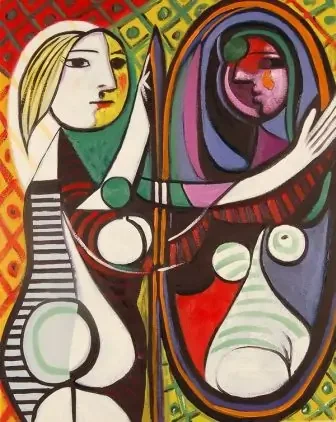 This painting of one of Picassos mistress was one of the last painting between 1931-1932; the medium he used was oil on canvas. the woman is seen staring at herself through the mirror.The painting features a unique style where the figure and her distorted reflection are shown side-by-side, using vivid, contrasting colors to convey an intense, almost claustrophobic atmosphere.
This painting of one of Picassos mistress was one of the last painting between 1931-1932; the medium he used was oil on canvas. the woman is seen staring at herself through the mirror.The painting features a unique style where the figure and her distorted reflection are shown side-by-side, using vivid, contrasting colors to convey an intense, almost claustrophobic atmosphere. -
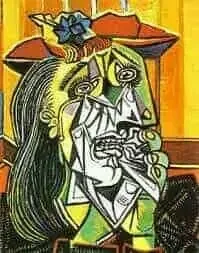 This painting had a message behind it during the civil war, but it ended up being a universal message of suffering. Picasso drew inspiration from contemporary events and sixteenth- and seventeenth-century religious imagery. It has come to say that the painting of the woman is Picasso's mistress Dora Maar. Pablo used a fragmented, geometric style, characterized by intense colors, sharp lines, and an open mouth in anguish, which reflects the horrors of war.
This painting had a message behind it during the civil war, but it ended up being a universal message of suffering. Picasso drew inspiration from contemporary events and sixteenth- and seventeenth-century religious imagery. It has come to say that the painting of the woman is Picasso's mistress Dora Maar. Pablo used a fragmented, geometric style, characterized by intense colors, sharp lines, and an open mouth in anguish, which reflects the horrors of war. -
 Picasso painted his lovely daughter through oil on canvas; he started playing with his latest artistic processing of space and color.The painting is meant to be un proportional and disoriented as he used it as a way to have fun while creating artwork; these types of techniques are within cubism.
Picasso painted his lovely daughter through oil on canvas; he started playing with his latest artistic processing of space and color.The painting is meant to be un proportional and disoriented as he used it as a way to have fun while creating artwork; these types of techniques are within cubism.